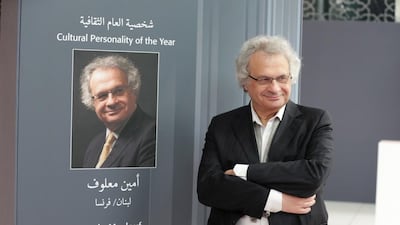Lebanese-born French author Amin Maalouf is in a celebratory mode because of two important events in his life – his 45th wedding anniversary and winning the 2016 Cultural Personality of the Year Award at The Sheikh Zayed Book Awards.
"It is wonderful, I am so happy and so grateful," Maalouf told The National before accepting the award at the Abu Dhabi International Book Fair yesterday.
Maalouf is a literary giant whose works, written mainly in French and translated into more than 40 languages, include more than 10 novels, numerous essays, articles and four librettos.
Among his most celebrated works was his debut 1986 novel Leo the African, written in the form of a memoir – the plot follows the historical fictional adventures of the restless 16th-century traveller Hassan Al Wazzan, a geographer who roamed Africa. Samarkand, published in 1988, continues his blend of history and fiction as he recreated the life of the Persian poet Omar Khayyam and his famous collection of poetry Rubaiyat in 11th-century Persia.
His non-fiction work includes 1983's The Crusades through Arab Eyes, an exploration of the turbulent period and how it affects Arab and Islamic societies today. On Identity, published in 1998, also known as In the Name of Identity: Violence and the Need to Belong, takes up the question of identity – the concept of "them" versus "us".
With other awards under the 67-year-old's belt, such as the Prix Goncourt for 1993's The Rock of Tanios, and The Prince of Asturias Award for Literature, the latest prize includes Dh1 million, a gold medal bearing the Sheikh Zayed Book Award logo and a certificate of merit.
Reserved and concise in his mannerism and speech, Maalouf is not very forthcoming with his answers. It is his wife Andrée who adds a personal touch during the interview, offering a glimpse into their lives. “He is very curious and very knowledgeable,” says Andrée Maalouf, who has written two cookery books on Lebanese cuisine, and is currently working on a third. “I am always learning something new with him.”
Maalouf interjects with a smile: “We both have this curiosity. We are always seeking and researching. Before I was quicker using my books, and now she is quicker, using Google on her smartphone.”
Andrée, who is the first to read his drafts, and offers suggestions and advice, says Maalouf is her “rock”.
“Whatever may be happening in his life, no matter how busy, I can rely on him. He is always present, he is there for me and [their three] children,” she says.
After his Abu Dhabi appearance, Maalouf plans to go straight back to writing – he has already started work on his next novel.
“I usually avoid talking about it until it is finished,” he says.
Famous for his historical novels, Maalouf’s work revolves around larger themes such as self-reflection, origins, migration and cultural tolerance, with characters and settings that span across cultures and continents.
He also likes exploring the issue of identity. “The Arab world is going through one of the most disturbing moments in its long history,” he says.
“That is one of the reasons why I prefer to write about the past. There were great moments in our past, of which we may certainly be proud. I am not sure our grandchildren will be proud of our generation. All what the world is seeing today are images of violence, destruction and fear.”
Maalouf and his family fled to France during the Lebanese civil war in 1976. Paris was where Maalouf established a permanent residence – he started out as a journalist before focusing entirely on writing.
But Lebanon features prominently in his thoughts, travels and his craft.
"Lebanon suffers from the situation that prevails in its neighbourhood. And although it has managed to avoid becoming a battleground, there is a lot of uncertainty," he says, shaking his head. "As for France and Europe as a whole, there are problems, too. Of a different nature, but very serious nonetheless, as one can perceive from the referendum that will take place in the United Kingdom in June. I wrote an essay a few years ago titled A Disordered World, and I feel that the world we are living in is, indeed, extremely disordered, and sometimes frightening.
“That is one of the reasons why I prefer to write about our past rather than about the grim moments we are experiencing today.”
Maalouf’s aloof demeanour cracks when asked about his favourite moment, and his voice softens as he relives the memory: “Two years ago, my first granddaughter was born. Taking her delicately in my arms will certainly remain one of my fondest memories.”
rghazal@thenational.ae

